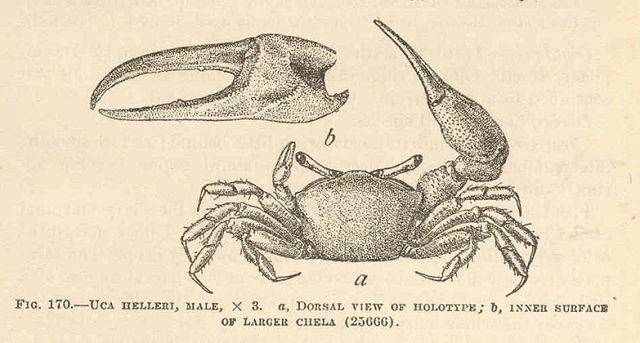Fiddler Crabs Image Gallery
Preview

Identifier
Figure 20
Medium
photograph
Date Created
5-2025
Keywords
Fiddler crabs;
Description
Alt Text: Composite photograph of the Minuca panema fiddler crab which includes several black & white images of different views of the crab, a color photograph, and a distribution map.
Composite Image Description: Figure 20. Minuca panema (Coelho, 1972). UNI 721. Collected: March 13, 2018, Caribbean Sea, Trinidad and Tobago, St. Ann’s Co., Maracas Bay, Burro River (10.75943, -61.44206). (A) Dorsal view. (B) Front view. (C) Inner cheliped. (D) Ocular view. (E) Ambulatory. (F) Color Photo. (G) Distribution Map (Finke 2024).
Species Description: Moderate-sized species (width < 19mm). Carapace length 68% width; frontal region 37% carapace width. Eyestalks short. Carapace widest posterior to frontal margin (Fig. 20A). Antero-lateral angle about 90°. Carapace smooth, convex and trapezoidal, < 20 mm. Lateral margins curve strongly to midline. Dactyl and pollex about same length as manus. Gap wide. Dactyl with two larger tubercles: one proximal the other distal (Fig. 20B,C). Pollex with larger tubercles distally. Inner surface of major cheliped with carina of tubercles lining dorsal edge of carpal cavity (Fig. 20C: ). Carina often ending in a patch of tubercles with upper row pointed to dactyl. A smooth triangular area above the carina terminus. Lower edge of carpal cavity with apex of tubercles at proximal end of oblique ridge (Fig. 20C). Distally oblique ridge across palm undeveloped. Dactyl joint with row of 5–8 tubercles (Fig. 20C). Lines of tubercles on pre-dactyl and articulating ridges not parallel. Predactyl ridge forming crescent arch initially extending toward palm but returns to articulation. On walking legs, merus width 37% length. Dorsal surface of dactyl without pubescence (Fig. 20E). No pubescence on ventral surface of manus, carpus or dactyl. Long setae plentiful on manus but sparse on merus of walking legs. Found from southern Trinidad to and Florianopolis in South America (Fig. 20G). This species is morphologically identical to Minuca burgersi (Holthuis, 1967). Species best distinguished based on collecting location and DNA sequencing (Thurman et al. 2023).
Object Description
1 PNG file
UNI Specimen Number
UNI 721
Year Collected
2018
Collection Location
10.75943, -61.44206
Gender
male
Copyright
2025 Abby Hutchins, Amber Finke, and Carl L. Thurman
Creative Commons License

This work is licensed under a Creative Commons Attribution-NonCommercial 4.0 International License
Type
Image
Language
en
File Format
image/png
Recommended Citation
Hutchins, Abby; Finke, Amber; and Thurman, Carl L., "Figure 20. Minuca panema" (2025). Fiddler Crabs Image Gallery. 20.
https://scholarworks.uni.edu/fiddlercrabs/20
Click below to download additional content.
Figure-20_minuca_panema_links.pdf (368 kB)PDF version composite image (active links)
Keywords
Fiddler crabs;




Comments
This composite image is of the Minuca panema fiddler crab. It is a part of the parent Fiddler Crabs Image Gallery collection at the University of Northern Iowa, which has images of Fiddler Crabs located in the Atlantic Ocean and the Gulf of Mexico from the following genera: Afruca, Leptuca, Minuca, and Uca.